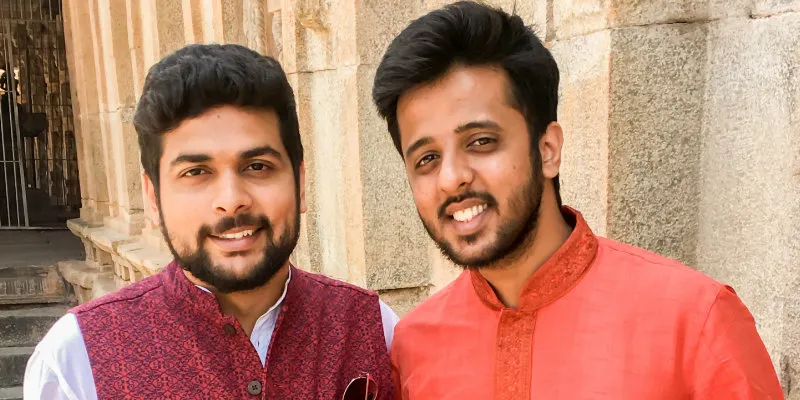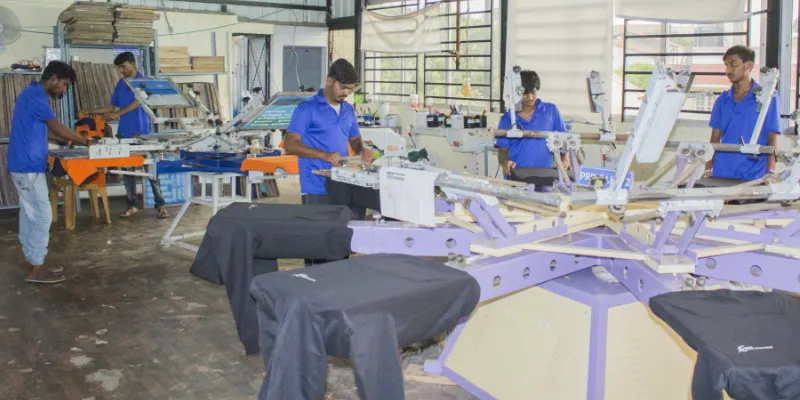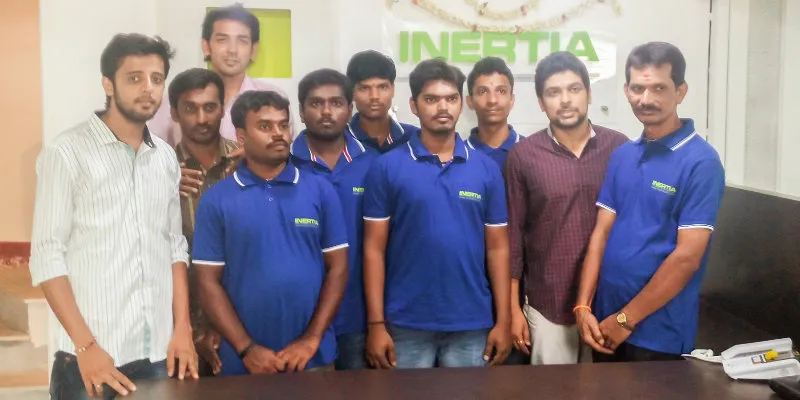This bootstrapped apparel startup has gone from Rs 10K to more than Rs 1cr in 2 years
InertiaCart has sold two lakh products so far and notched up more than Rs 1 crore in annual sales. Here's how it did it.
Drawing inspiration from ideal leaders of the business world, Bharath Hegde (27) and Darshan Desai (26) started the customised apparel venture at Darshan’s garage. With one delivery boy and a small printing unit, the duo set out to build a loyal customer base.

The seed capital infused initially was Rs 10,000 out of which Rs 6,000 was used for buying t-shirt samples while the rest was used for printing activities.
Hard work paid off and their number of clients quadrupled in two months. Marking it as a first step towards success, they hired five people, built a new factory, and invested in new machinery. However, they always intended to bootstrap by seeking investments from relatives, friends, and even neighbours.
InertiaCart was registered on 12 January, 2015 as a private limited company. After four months, the two founders set-up a swanky office with separate workstations, cabin, display store and more. Moreover, on-time deliveries and satisfied customers were their other accomplishments.
Everything was not that easy
Bharath portrays his entrepreneurial journey as “a Harley Davidson motorbike on a bad piece of road.” For him, it is a mix of high adrenaline, ambition, and passion.
Hurdles started knocking on their door when the number of orders multiplied. Vendors couldn’t deliver orders on time and this adversely affected production. However, it led to the opening of a new stitching unit and recruitment of more people. Says Bharath,
“To be great you need to start small. InertiaCart started out with just one employee, an order of 45 t-shirts and a handful of trusted clients. Today, we are a team of 29. We have trained show runners spread over four sections—marketing, production, design, and human resource.”
Darshan and Bharath have doubled up as salesmen and delivery boys at different times, and even done printing, and packaging. The challenges they faced, according to Bharath, include late night deliveries, begging vendors for the product types, printing mistakes/errors at the last moment, customers not paying on time, and rejection of orders due to faults in the product.

Bharath earned an engineering degree in electronics from Reva University in 2011. Soon after graduation, he and his friend started an advertising firm, FourKubes, with the idea of publishing advertisements on the cover pages of notebooks. In 2012, Bharath, along with his friends, started working on corporate events and media printing for a year.
Darshan completed his B.Com. from Jain University in 2012 but started his event management firm during the final year of college. In 2013, he started customised apparel brand Print Pro and generated a revenue of Rs 75 lakh in less than two years. However, both the founders quit their previous ventures. Says Bharath,
“We were competitors for almost two years. We met regularly at a common vendor’s place. We knew each other for almost two years.”
Customising the apparel
After receiving orders, the InertiaCart team gets in touch with customers, understands their requirements, and sends them a mock-up. Once the design and products are approved, a sample print is made and shown to the customers. On receiving approval, the product is manufactured and delivered at the customers' doorsteps.

The company offers 15 types of products in three different quality materials and more than 12 colours, with the price ranging from Rs 80 to Rs 750. Customisation is not just restricted to printing but also extends to buttons and the colour of the stitch. InertiaCart receives orders in the range of 300 to 500 a month.
Bharath says that while InertiaCart has both online and offline presence, 90 percent of the orders are placed offline. Till now they have sold two lakh products. They have a team of five people who not only generate leads from corporates but also look after sales generated from school institutions. Arun Kumar, one of their team members, has connections in more than 100 institutions across Karnataka.
In the next two years, InertiaCart is planning to expand to Delhi, Hyderabad and other cities. Also, the plan is to expand the production facility at Dharwad/Hubli in order to create more jobs. According to its balance sheet, InertiaCart earned a revenue of Rs 14,10,582 in 2015 (three months), Rs 1,01,27,060 in 2015-2016 and Rs 1,23,39,500 in 2016-17.
According to the India Brand Equity Foundation, India accounts for 14 percent of the world’s production of textile fibres and yarns. The domestic textile and apparel industry is estimated to to be worth $141 billion by 2021, thanks by factors like organised retail, favourable demographics, and rising income levels. Textile and apparel exports from India are expected to increase to $82 billion by 2021.
Buoyed by demand from school students and corporates, customised apparel in the past few years has taken the apparel market to a new level. Startups have not missed the opportunity to capitalise on this. A few that have made a mark for themselves in the market are Threads & Shirts, Inkmonk, My Dream Store, iLogo, and 99tshirts.
Website: InertiaCart







